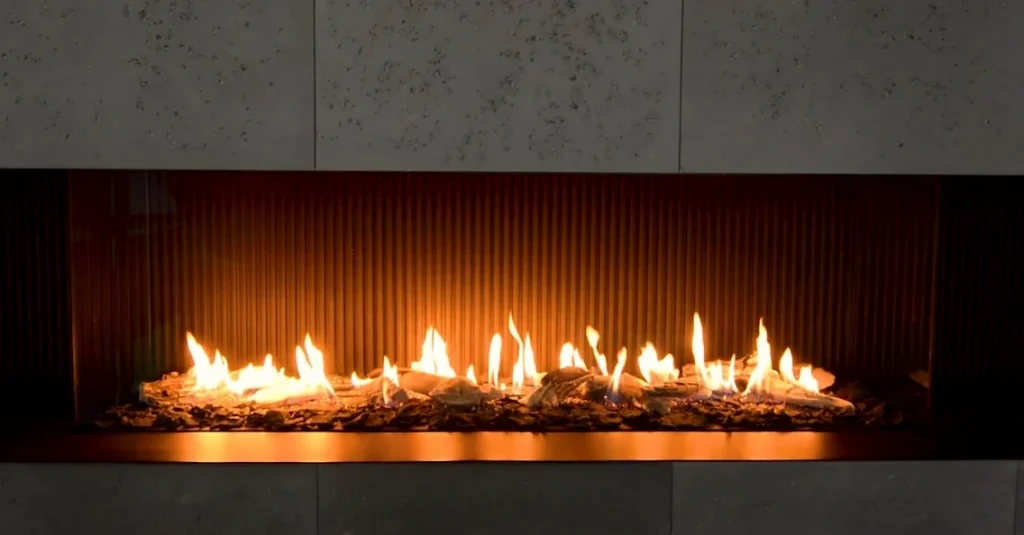Are Gas Fireplaces Safe for Birds?
If you’re about to install a new gas fireplace in your home’s interior, you may be wondering whether or not your pet bird can stay with you in the same room. Are gas fireplaces safe for birds? Can gas produced from a fireplace harm your bird?
Yes, gas fireplaces are safe for birds. Your bird can enjoy your company in the same room with a gas fireplace. There are some advantages to placing your bird in the same room with a fireplace.
In this article, we’ll explain why gas fireplaces are safe for birds.
Understanding the bird’s respiratory system helps you to know which gasses are dangerous to birds which are not.

Understanding the bird’s respiratory system
Bird respiratory system exchanges oxygen and carbon dioxide from the air to the tissues. Another important role the respiratory system plays is thermoregulation of the body (maintaining normal body temperature).
Where other vertebrates have large lungs, but birds have relatively small lungs. Interesting matter is that, beside these lungs, birds have an additional nine air sacs. These air sacs are not directly involved in the exchange of oxygen and carbon dioxide but play a crucial role in respiration.

During inhalation of other vertebrates like humans, air with high concentration of oxygen enters into lungs. On the other hand, blood vessels around alveoli contain blood with high concentration of carbon dioxide. So, oxygen from fresh air is transferred to blood and carbon dioxide of blood comes to the air in lungs. This air is now high in carbon dioxide concentration. We then exhale it.
This scenario is completely different in the case of birds. During inhalation, air is stored in air sacs below lungs. Air sacs then flow air through lungs. During exhalation, air with carbon dioxide from lungs is stored in two upper air sacs and simultaneously released and lower air sacs again filled with fresh air.
This simultaneous process allows birds to have an unidirectional oxygen flow all time in the lungs. Their lungs never get empty. That’s why birds can fly for an extended time.
As birds have relatively smaller lungs and many air sacs which are always filled with air hence any extra particulate matter or irritant is actually continuously present in the respiratory system. For vertebrates, lungs get empty during the respiratory cycle hence lowers the concentration of toxicants. For birds, air spends more time in the respiratory system than others.
Why gas fireplaces are not dangerous to birds
If we see the structure of modern gas fireplaces, we will see most of them come in two chamber systems. Gas produced during burn never comes into the room. If by accident, gas leaked into the room, it will be deadly not only for your birds but also for you.
By product of gas burning is primarily carbon dioxide, which is not toxic to birds. Incomplete burning may produce carbon monoxide, which is a silent killer. Again, it will not only kill your birds but you as well.
Natural gas is primarily methane which is not toxic at all. So are propane and butane. So if gas leaks into the room, less likely your birds will die from the toxic effect of these gasses. But surely your room will turn into a large bomb, and any small spark will cause huge explosion.
So during installation of ner fireplace, double check with gas leakage possibility and incomplete burning possibilities. It is better to hire a trained professional for this job.
Is there any benefits to keep birds in the room with fireplace
You have to keep your birds warm during winter. Although birds can tolerate winter to some extent. But when the temperature drops to zero, you must take measures. Most of the bird keepers use oil filled bird room heaters or electric bird heaters. Both of them will add additional cost to your electricity bill. This extra cost can be minimized by placing your bird in a room with a fireplace.
Are ceramic logs safe for birds
Ceramic logs do not burn like wood logs. They just heat up and release heat to their surroundings. Heating ceramic logs do not release any toxic fumes, so they are completely safe for birds.
Precaution to be taken
Pet birds can harm themself by almost everything in this universe. So be careful while keeping your birds in a room with a fireplace. You must not release your bird with an open fireplace. Your bird can catch fire. Keep away your birds from the door of fireplaces.
Keep an eye on humidity of the air of the room. Dry air will cause irritation to your bird’s foot. An excess heat may cause heat stroke to your birds. It is a good idea to put a bowl of water near/top of the cage. If a bird feels hot it can easily take a bath to cool itself.
If you want to keep your birds with you in the same room with a fireplace then ventilation of that fireplace should be the main concern. A well ventilated fireplace would not release carbon dioxide or monoxide into the room.
Advantages and Disadvantages of Gas Fire Place
Advantages of a gas fireplace
-More efficient than wood-burning fireplaces, using up to 99% of the fuel.
– Easy to light and maintain, with no mess or ashes.
– Can be used in almost any indoor space, including apartments, without the need for a chimney.
– Does not require additional ventilation.
Disadvantages of a gas fireplace
-Can be expensive to install.
– Requires a gas line hookup.
– Can produce carbon monoxide if not properly installed and maintained.
– May not have the same cozy feel and smell as a wood-burning fireplace.
When it comes to heating efficiency, gas fireplaces, electric fireplaces, and wood-burning fireplaces all have their own advantages and disadvantages. Gas fireplaces are the most efficient of the three, with up to 99% of the fuel being used for heat. Gas fireplaces also require less maintenance than wood-burning fireplaces, with no need for a chimney and no mess or ashes to clean up.
Electric fireplaces require less installation and maintenance than gas fireplaces, but they also produce less heat.
Wood-burning fireplaces are the least efficient of the three, with only about 10-20% of the fuel being used for heat. However, wood-burning fireplaces provide a warm and cozy atmosphere and a unique smell that can’t be replicated with gas or electric fireplaces.
When deciding which type of fireplace is right for you, it’s important to consider your needs and budget. Gas fireplaces are the most efficient, but they require a gas line hookup and can be more expensive to install. Electric fireplaces are the easiest to install and maintain. Wood-burning fireplaces are somewhere in between, requiring more maintenance but providing a unique atmosphere. But wood fire places are not safe for pet birds.
How much does it cost to run a gas fireplace for one day?
The cost of running a gas fireplace for one day will depend on the size of the fireplace and the rate that you are being charged for the gas. Generally, it can cost anywhere from $1 – $5 to run a gas fireplace for one day.
Do gas fireplaces use a lot of propane?
No, gas fireplaces typically do not use a lot of propane. Most gas fireplaces use natural gas or propane for fuel, and the amount of fuel used depends on the size of the fireplace and how often it is used. Generally, a gas fireplace can use anywhere from 2-6 gallons of propane per hour.
How do you keep your house warm with a gas fireplace?
You can keep your house warm with a gas fireplace by adjusting the flame size and temperature settings. You can also use a thermostat to set the desired temperature and have the gas fireplace automatically adjust the flame size to reach that temperature. Additionally, you can use a fan to circulate the heat from the fireplace throughout the room.
Is a blower necessary for a gas fireplace?
A blower is not necessary for a gas fireplace, but it can be beneficial. A blower will help to circulate the heat created by the fireplace throughout the room more efficiently, making it more comfortable. Additionally, a blower can be used to help draw cool air into the fireplace, allowing for greater efficiency and lower fuel costs.
Which is better ventless or vented gas fireplace?
The best type of gas fireplace for you will depend on your needs and preferences. Vented gas fireplaces are more efficient than ventless models, but they require a chimney or exhaust pipe to vent the combustion byproducts. Ventless gas fireplaces are less efficient but they don’t require a vent, making them easier to install in a variety of locations.
